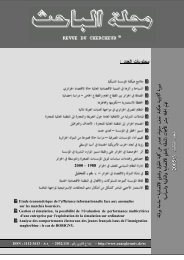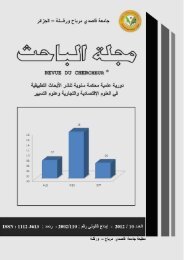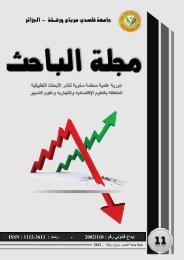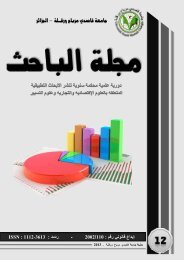Diversité et performance de la participation budgétaire : cas des entreprises au Maroc ______________________________________________________________ 30 - Simons R. (1990), The role of management control systems in creating competitive advantage: new perspectives, Accounting, Organizations and Society, Vol. 15, n°1/2, p. 127-143. 31 - Sponem S. (2002), op. cit. 32 - Chenhall R.H. (2003), op. Cit. 33 - Chapman C.S. (1997), op. cit. 34 - Bruns W. J., Waterhouse J.H. (1975), Budgetary control and organization structure, Journal of accounting research, Vol.13, n°2, autumn, p. 177-203. 35 - Merchant K. (1981), op. cit. 36 - Sponem S. (2002), op. cit. 37 - Chapman C.S. (1997), op. cit. 38 - Fisher J.G. (1998), op.cit. 39 - Hartmann F. (2000), The appropriateness of RAPM: towards the further development of theory, Accounting, Organizations and Society, Vol. 25, n°4-5, p. 451-482. 40 - Ezzamel M. (1990), The impact of environmental uncertainty, managerial autonomy and size on budget characteristics, Management Accounting Research, 1, p. 181-197. 41 - Govindarajan V. (1986), Impact of Participation in the Budgetary Process on Managerial Attitudes and Performance: Universalistic and Contingency Perspectives, Decision Sciences, Vol. 17, p. 496-516. 42 - Sponem S. (2002), op. cit. 43 - Argyris C. (1952), The impact of budgets on people, New York: School of Business and Public Administration, Cornell <strong>University</strong>. 44 - Hofstede G. (1967), The game of budget control, London, Tavistock. (Traduction française: Contrôle budgétaire, les règles du jeu, Paris, éd. Hommes et Techniques, 1977). 45 - Nouri H. et Parker R. J. (1998),The relationship between budget participation and job performance: the role of budget adequacy and organizational commitment, Accounting, Organizations and Society, Vol.23, n°5/6, p.467-483 46 - Argyris C. (1952), op. cit. 47 - Merchant K. (1981), op. cit. 48 - Brownell P. (1982), The role of accounting data in performance evaluation, budgetary participation, and organizational effectiveness, Journal of Accounting Research, Vol. 20, n° 1, Spring, p. 12-27. 49 - Stedry A.C. (1960), Budget control and cost behavior, Prentice-Hall, Englewood Cliffs, N.J. 50 - Milani K. (1975), The relationship of participation in budget-setting to industrial supervisor performance and attitudes: a field study, The Accounting Review, Vol. 50, n° 2, April, p. 274-284. 51 - Kenis I. (1979), op. Cit. 52 - <strong>El</strong>khol. B.G. et Wallin. J, (2002), Is the annual budget really dead? The European Accounting Review, Vol.9, n°4, p. 519-539. 53 - Nouri H. et Parker R. J. (1998), op. cit. 54 - Miles R.E., Snow C.C. (1978), Organizational Strategy, Structure and Process, McGraw Hill, New York. 55 - Ces items sont fortement inspirés de Mouline J.P. (2000), La PME familiale française et son orientation stratégique: une étude exploratoire, Cahier de recherche n° 2000-01, GREFIGE, Université Nancy 2; 56 - Kalika M. (1987), op. cit. 57 - Ces items sont largement inspirés de Germain C. (2004), La contingence des systèmes de mesure de la performance : les résultats d’une recherche empirique sur le secteur des PME, Revue Finance Contrôle Stratégie, Vol.7, mars, p.33-52. - 20 -
_______________________________________________________________________________________________________________________________________ مجلة الباحث – عدد 2011 / <strong>09</strong> Determinants of Savings : An Empirical Evidence from African Countries, 1990-1999 Salih Mustafa Ahmed Mualley The Academy of Islamic Fiqh – sudan Abstract :This study examined from an empirical point of view the response of domestic savings in a set of African countries to per capita income, commercial banks’ interest rate, and the age dependency ratio. For this purpose ordinary least squares technique is applied to a cross-section data on domestic savings, income, commercial banks’ interest rate, and age dependency ratio taken from African countries for the period (1990-1999). The results suggest that African savings are elastic to income only. Key Words : Determinants, Savings, Empirical, AfricanCountries. 1. Introduction Conventional economic theory suggests that the mobilisation of domestic and foreign savings is important for accelerating economic growth. The problem of this study is to answer the question that, how to mobilize the African savings, and its importance appear from the importance of savings for investment and economic growth. Many economists regarded income, the rate of interest, and the age dependency ratio as important determinates of savings. Almost all economists, notably Burrows and Theodor (1974), Samuelson (1976), Leavačic (1976), Noel (1980), and Harvey (1977, 1985), seem to have believed that there exists a positive relationship between savings and income level. Some controversy, however, has surrounded the effect of the rate of interest on savings. While some economists suggest a positive relationship between savings and the deposit rate of interest, others reject this thesis at both the theoretical and empirical levels. Also it is believed that since older people as well as children are usually classified as non-productive members of the society, the increase in their numbers relative to the productive members of the society, a ratio which is referred to as the age dependency ratio, will more likely lead to a reduction in savings. This paper is an attempt to examine from an empirical point of view the determinants of savings in Africa. For this purpose, Ordinary Least Squares regression technique is applied to a cross-section data taken for the period (1990-1999) to estimate a relationship between savings on the one hand and its hypothesized determinants, namely income, commercial banks deposit rate, and the age dependency ratio, on the other hand for a set of African countries. The results reveal that, over this period of time, African domestic savings are elastic only to income. -21-
- Page 2:
دورية أكاديمية مح
- Page 6:
أعضاء الهيئة الع
- Page 10 and 11:
مجلة الباحث - العدد
- Page 12 and 13:
ميت مجلة الباحث - عد
- Page 14 and 15:
ةلمج ثحابلا - ددع 09 2
- Page 16 and 17:
ةلمج ثحابلا - ددع 09 2
- Page 18 and 19:
ةلمج ثحابلا - ددع 09 2
- Page 20 and 21:
ةلمج ثحابلا - ددع 09 2
- Page 22 and 23:
مجلة الباحث - عدد 2011
- Page 24 and 25:
2011 09 1222 2691 behih22@hotmail.c
- Page 26 and 27:
2011 09 1 1 Moyens de paiement fidu
- Page 28 and 29:
2011 09 2 2691 M1 02 1202022 1202
- Page 30 and 31:
2011 09 12 (V) En temps réels M.V
- Page 32 and 33:
2011 09 : 6 Convention inter b
- Page 34 and 35:
2011 09 Domiciliation bancaire 05
- Page 36 and 37:
2011 09 2 1222 2691 2 1222 111 211
- Page 38 and 39:
___________________________________
- Page 40 and 41:
___________________________________
- Page 42 and 43:
___________________________________
- Page 44 and 45:
___________________________________
- Page 46 and 47:
___________________________________
- Page 48 and 49:
___________________________________
- Page 50 and 51:
مبررات ودوافع التو
- Page 52 and 53:
مجلة الباحث - عدد 2011
- Page 54 and 55:
مجلة الباحث - عدد 2011
- Page 56 and 57:
مجلة الباحث - عدد 2011
- Page 58 and 59:
مجلة الباحث - عدد 2011
- Page 60 and 61:
مجلة الباحث - عدد 2011
- Page 62 and 63:
___________________________________
- Page 64 and 65:
___________________________________
- Page 66 and 67:
___________________________________
- Page 68 and 69:
___________________________________
- Page 70 and 71:
___________________________________
- Page 72 and 73:
___________________________________
- Page 74 and 75:
___________________________________
- Page 76 and 77:
___________________________________
- Page 78 and 79:
___________________________________
- Page 80 and 81:
___________________________________
- Page 82 and 83:
___________________________________
- Page 84 and 85:
___________________________________
- Page 86 and 87:
___________________________________
- Page 88 and 89:
مساهمة الإدارة ال
- Page 90 and 91:
مساهمة الإدارة ال
- Page 92 and 93:
مساهمة الإدارة ال
- Page 94 and 95:
مساهمة الإدارة ال
- Page 96 and 97:
مساهمة الإدارة ال
- Page 98 and 99:
مساهمة الإدارة ال
- Page 100 and 101:
مساهمة الإدارة ال
- Page 102 and 103:
ينتب __________________________
- Page 104 and 105:
___________________________________
- Page 106 and 107:
___________________________________
- Page 108 and 109:
___________________________________
- Page 110 and 111:
___________________________________
- Page 112 and 113:
___________________________________
- Page 114 and 115:
___________________________________
- Page 116 and 117:
___________________________________
- Page 118 and 119:
___________________________________
- Page 120 and 121:
___________________________________
- Page 122 and 123:
___________________________________
- Page 124 and 125:
___________________________________
- Page 126 and 127:
ص، ___________________________
- Page 128 and 129:
___________________________________
- Page 130 and 131:
___________________________________
- Page 132 and 133:
___________________________________
- Page 134 and 135:
___________________________________
- Page 136 and 137:
___________________________________
- Page 138 and 139:
___________________________________
- Page 140 and 141:
___________________________________
- Page 142 and 143:
___________________________________
- Page 144 and 145:
صال ____________________________
- Page 146 and 147:
___________________________________
- Page 148 and 149:
___________________________________
- Page 150 and 151:
___________________________________
- Page 152 and 153:
___________________________________
- Page 154 and 155:
___________________________________
- Page 156 and 157:
___________________________________
- Page 158 and 159:
___________________________________
- Page 160 and 161:
___________________________________
- Page 162 and 163:
___________________________________
- Page 164 and 165:
___________________________________
- Page 166 and 167:
1 1 ___________________
- Page 168 and 169:
___________________________________
- Page 170 and 171:
___________________________________
- Page 172 and 173:
___________________________________
- Page 174 and 175:
___________________________________
- Page 176 and 177:
___________________________________
- Page 178 and 179:
___________________________________
- Page 180 and 181:
___________________________________
- Page 182 and 183:
___________________________________
- Page 184 and 185:
___________________________________
- Page 186 and 187:
___________________________________
- Page 188 and 189:
___________________________________
- Page 190 and 191:
___________________________________
- Page 192 and 193:
___________________________________
- Page 194 and 195:
___________________________________
- Page 196 and 197:
___________________________________
- Page 198 and 199:
___________________________________
- Page 200 and 201:
___________________________________
- Page 202 and 203:
___________________________________
- Page 204 and 205:
___________________________________
- Page 206 and 207:
___________________________________
- Page 208 and 209:
___________________________________
- Page 210 and 211:
تشخيص المتغيرات ال
- Page 212 and 213:
تشخيص المتغيرات ال
- Page 214 and 215:
تشخيص المتغيرات ال
- Page 216 and 217:
تشخيص المتغيرات ال
- Page 218 and 219:
___________________________________
- Page 220 and 221:
___________________________________
- Page 222 and 223:
___________________________________
- Page 224 and 225:
___________________________________
- Page 226 and 227:
___________________________________
- Page 228 and 229:
___________________________________
- Page 230 and 231:
___________________________________
- Page 232 and 233:
___________________________________
- Page 234 and 235:
___________________________________
- Page 236 and 237:
___________________________________
- Page 238 and 239: ___________________________________
- Page 240 and 241: ___________________________________
- Page 242 and 243: ___________________________________
- Page 244 and 245: ___________________________________
- Page 246 and 247: ___________________________________
- Page 248 and 249: ___________________________________
- Page 250 and 251: ___________________________________
- Page 252 and 253: ___________________________________
- Page 254 and 255: ___________________________________
- Page 256 and 257: ___________________________________
- Page 258 and 259: ___________________________________
- Page 260 and 261: ___________________________________
- Page 262 and 263: أهمية السيولة الن
- Page 264 and 265: : أهمية السيولة ال
- Page 266 and 267: أزمة السيولة النق
- Page 268 and 269: أزمة السيولة النق
- Page 270 and 271: Systèmes de contrôle de gestion e
- Page 272 and 273: Systèmes de contrôle de gestion e
- Page 274 and 275: Systèmes de contrôle de gestion e
- Page 276 and 277: Systèmes de contrôle de gestion e
- Page 278 and 279: Systèmes de contrôle de gestion e
- Page 280 and 281: Diversité et performance de la par
- Page 282 and 283: Diversité et performance de la par
- Page 284 and 285: Diversité et performance de la par
- Page 286 and 287: Diversité et performance de la par
- Page 290 and 291: Determina of Savings : An Empirical
- Page 292 and 293: Determina of Savings : An Empirical
- Page 294 and 295: Determina of Savings : An Empirical
- Page 296 and 297: Determina of Savings : An Empirical
- Page 298 and 299: Determina of Savings : An Empirical
- Page 300 and 301: PAS "D’ARGENT LIQUIDE" DANS LE SY
- Page 302 and 303: PAS "D’ARGENT LIQUIDE" DANS LE SY
- Page 304 and 305: PAS "D’ARGENT LIQUIDE" DANS LE SY















